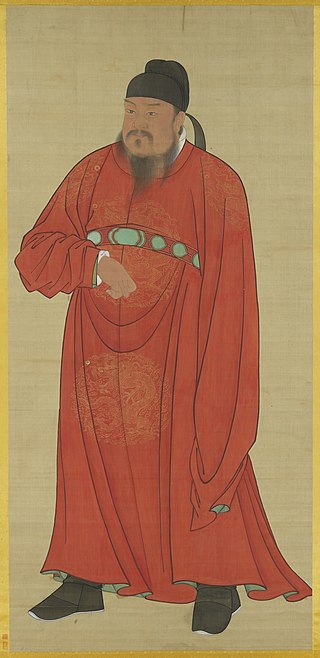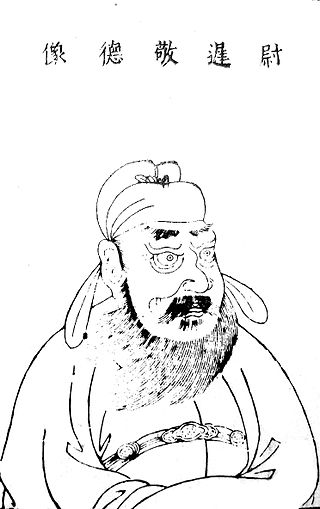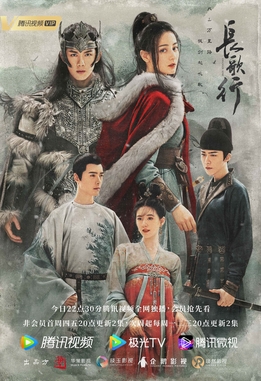
Emperor Taizong of Tang, previously Prince of Qin, personal name Li Shimin, was the second emperor of the Tang dynasty of China, ruling from 626 to 649. He is traditionally regarded as a co-founder of the dynasty for his role in encouraging his father Li Yuan to rebel against the Sui dynasty at Jinyang in 617. Taizong subsequently played a pivotal role in defeating several of the dynasty's most dangerous opponents and solidifying its rule over China proper.
Li Tai, courtesy name Huibao (惠褒), nickname Qingque (青雀), formally Prince Gong of Pu (濮恭王), was an imperial prince of the Chinese Tang dynasty.

Emperor Gaozu of Tang, born Li Yuan, courtesy name Shude, was the founding emperor of the Tang dynasty of China, reigning from 618 to 626. Under the Sui dynasty, Li Yuan was the governor in the area of modern-day Shanxi, and was based in Taiyuan.

Wei Zheng, courtesy name Xuancheng, posthumously known as Duke Wenzhen of Zheng, was a Chinese politician and historian. He served as a chancellor of the Tang dynasty for about 13 years during the reign of Emperor Taizong. He was also the lead editor of the official history of the Sui dynasty, the Book of Sui, which was composed in 636.
Feng Lun, courtesy name Deyi, better known as Feng Deyi, formally Duke Miao of Mi, was a Chinese official of the Sui and Tang dynasties who served as a chancellor during the reigns of Emperor Gaozu of Tang and Emperor Taizong of Tang. He was praised for his quick thinking but criticized by historians for his being overly attentive to the emperors' desires.

Qin Qiong, courtesy name Shubao, better known as Qin Shubao, was a Chinese general who lived in the early Tang dynasty of China. Along with Yuchi Gong, he continues to be worshipped in China as a door god. He is also known by his posthumous name Duke Zhuang of Hu.

Yuchi Gong (尉遲恭) or Yuchi Rong (尉遲融), courtesy name Jingde (敬德), also known by his posthumous name Duke Zhongwu of E, was a prominent general who lived in the early Tang dynasty. Yuchi Jingde and another general Qin Shubao are worshipped as door gods in Chinese folk religion.

Luo Yi, known during service to the Tang dynasty as Li Yi (李藝), courtesy name Ziyan (子延) or Ziting (子廷), was a Sui dynasty official who rose against the rule of Emperor Yang of Sui and occupied the modern Beijing region. He subsequently submitted to Emperor Gaozu of Tang and was created the Prince of Yan and granted the imperial surname of Li. He subsequently, in the struggle between Emperor Gaozu's sons Li Jiancheng the Crown Prince and Li Shimin the Prince of Qin, joined Li Jiancheng's faction. After Li Shimin killed Li Jiancheng in 626 and forced Emperor Gaozu to yield the throne to him, Li Yi was fearful, and he rebelled against Emperor Taizong in 627. He was soon defeated and killed.
Li Jiancheng (Chinese: 李建成; pinyin: Lǐ Jiànchéng; 589 – July 2, 626, formally Crown Prince Yin, nickname Vaishravana, was the first crown prince of the Chinese Tang dynasty. He was the oldest son of the founding emperor Emperor Gaozu and the crown prince after the founding of the dynasty in 618 CE.
Li Yuanji (李元吉), formally Prince La of Chao (巢剌王), more commonly known by the title of Prince of Qi (齊王), nickname Sanhu (三胡), was an imperial prince of the Chinese Tang dynasty. He was a son of the dynasty's founder Emperor Gaozu of Tang, and in the intense rivalry developed between his older brothers Li Jiancheng the Crown Prince and Li Shimin the Prince of Qin, he sided with Li Jiancheng and often advocated drastic actions against Li Shimin, including assassination. In 626, Li Shimin, fearing that Li Jiancheng and Li Yuanji were about to kill him, laid an ambush for them at Xuanwu Gate outside the palace and killed them. Li Shimin then effectively forced Emperor Gaozu to yield the throne to him.

The Xuanwu Gate Incident was a palace coup for the throne of the Tang dynasty on 2 July 626, when Prince Li Shimin and his followers assassinated Crown Prince Li Jiancheng and Prince Li Yuanji. Li Shimin, the second son of Emperor Gaozu, was in an intense rivalry with his elder brother Li Jiancheng and younger brother Li Yuanji. He took control and set up an ambush at Xuanwu Gate, the northern gate leading to the Palace City within the imperial capital Chang'an. There, Li Jiancheng and Li Yuanji were murdered by Li Shimin and his men. Within three days after the coup, Li Shimin was installed as the crown prince. About two months later, Emperor Gaozu abdicated and passed the throne to Li Shimin, who would become known as Emperor Taizong.
Chen Shuda (572–635), courtesy name Zicong, formally Duke Zhong of Jiang, was an imperial prince of the Chen dynasty, who, after the destruction of Chen, served as an official under the Sui and Tang dynasties, becoming a chancellor during the reigns of the Tang emperors Gaozu and Taizong.
Yuwen Shiji, courtesy name Renren, formally Duke Zong of Ying, was a Chinese statesman and politician of the Sui and Tang dynasties, serving as a chancellor, as Shizhong (侍中) (625–626) and Zhongshu Ling (中書令) (626–627), during the reigns of Emperors Gaozu and Taizong of Tang. He was previously an imperial prince in the short-lived state of Xu (許), which was ruled by his brother Yuwen Huaji.

Xiao Yu, courtesy name Shiwen, posthumously known as Duke Zhenbian of Song, was an imperial prince of the Western Liang dynasty who later became an official under the Sui and Tang dynasties. He served as a chancellor during the reigns of the emperors Gaozu and Taizong in the early Tang dynasty.

Fang Qiao, courtesy name Xuanling, better known as Fang Xuanling, posthumously known as Duke Wenzhao of Liang, was a Chinese statesman and writer who served as a chancellor under Emperor Taizong in the early Tang dynasty. He was the lead editor of the historical record Book of Jin and one of the most celebrated Tang dynasty chancellors. He and his colleague, Du Ruhui, were often described as role models for chancellors in imperial China.

Du Ruhui, courtesy name Keming, posthumously known as Duke Cheng of Lai, was a Chinese official who served as a chancellor under Emperor Taizong in the early Tang dynasty. He and his colleague, Fang Xuanling, were often described as role models for chancellors in imperial China.
Wang Gui (571–639), courtesy name Shujie, posthumously known as Duke Yi of Yongning, was a Chinese official who served as a chancellor during the reign of Emperor Taizong in the Tang dynasty. He had previously served Li Shimin's elder brother, Li Jiancheng, with whom Li Shimin was locked in an intense rivalry during the reign of their father, Emperor Gaozu, but after Li Shimin killed Li Jiancheng and then took the throne, he knew that Wang was faithful to Li Jiancheng and was capable, and therefore retained him, eventually making him chancellor. Wang was known for his honest and blunt criticism of the emperor, and for that was honored by Taizong, who appreciated such criticism.
Dai Zhou, courtesy name Xuanyin, posthumously known as Duke Zhong of Dao, was a Chinese official who lived in the Sui dynasty and early Tang dynasty. He served as a chancellor during the reign of Emperor Taizong of Tang.

Hou Junji was a Chinese general and official who served as a chancellor during the reign of Emperor Taizong in the Tang dynasty. He is best known for leading the Tang military campaigns against the Gaochang and Tuyuhun kingdoms. In 643, he was implicated in a plot by the crown prince, Li Chengqian, to overthrow Emperor Taizong, and was executed.

The Long Ballad, also known as Chang Ge Xing, is a 2021 Chinese historical series based on the 2011 manhua of the same name by Xia Da. It is directed by Zhu Ruibin and stars Dilraba Dilmurat, Leo Wu, Zhao Lusi and Liu Yuning. Set against the backdrop of the Tang dynasty, during the reigns of Emperor Gaozu and Emperor Taizong, the drama tells the story of an imperial princess who seeks revenge for her family, and in doing so, her fate interwines with that of a tribal prince. Although it features many real historical figures, most of the relationship between the characters and plotlines are fictional. Chinese American Film Festival 2021 Golden Angel Award for Dilraba Dilmurat Golden Angel Award for Outstanding Television Series "The Long Ballad"